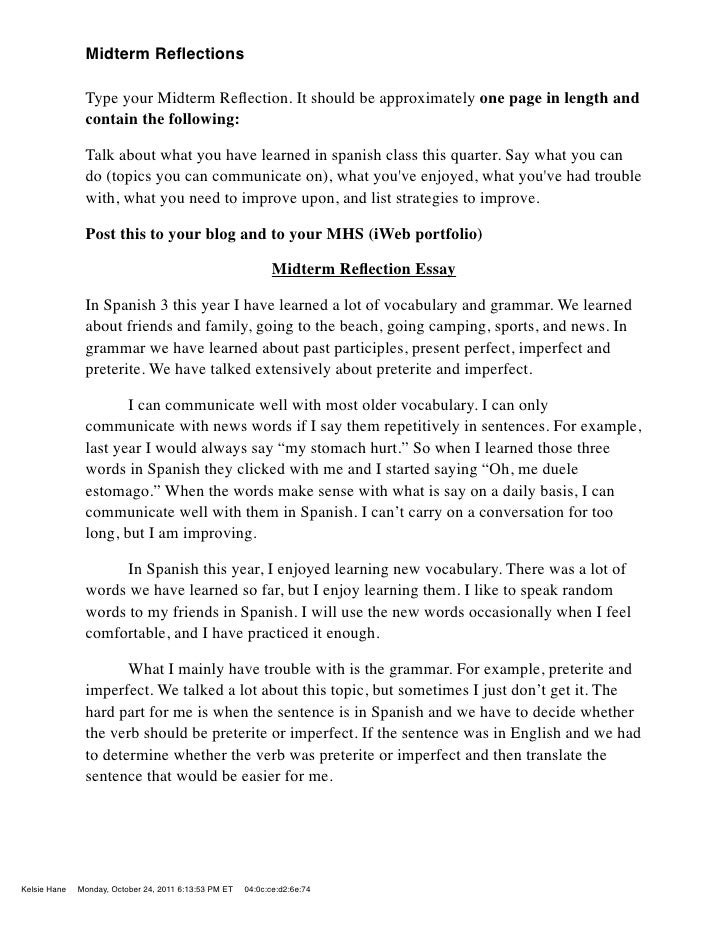
A reflective journal is a place to write down your daily reflection entries. It can be something good or bad that has happened to you that you can self-reflect on and learn from past experiences. A reflective journal can help you to identify important learning events that had happened in your life Reflective writing for an assignment Writing reflectively for the purposes of an assignment should not involve merely describing something that happened. Nor does it mean pouring out everything you think and feel in a totally unstructured way. Reflective writing requires a clear line of thought, use of evidence or examples to illustrate your Why Reflective Writing? Types of Reflective Writing Experiential Reflection Reading Reflection Approaches to Reflective Inquiry Experiential Reflection Reading Reflection A note on mechanics Why Reflective Writing? Reflection offers you the opportunity to consider how your personal experiences and observations shape your thinking and your acceptance of new
Examples of Reflective Writing | UNSW Current Students
A reflective journal is a place to write down your daily reflection entries. It can be something good or bad that has happened to you that you can self-reflect on and learn how to write a reflection on a course past experiences. A reflective journal can help you to identify important learning events that had happened in your life.
The events include your relationships, careers and personal life. By writing a reflective diary how to write a reflection on a course, you can find the source of your inspiration that defines you today.
A reflective journal also provides a better understanding of your thought process. According to Schön, there are two types of reflection, one during and one after an activity or event. When you are thinking about or reflecting while you are in an activity, you are using reflection in-action. Some reflection include:. You can do reflect-on-action once the activity has finished based on what you can remember about it.
Step back into the experience, explore your memory and retrieve what you can recall. Reflect and understand what has happened and draw lessons from the experience. Use the three "W"s to write reflectively. The three "W"s are WhatSo What and What next. Conclude what you can learn from the event and how you can apply it next time. Here are the 10 writing prompts to guide you in self-reflection and self-discovery.
Get access to your diary wherever you are — download the free Journey app for your all of your iOS and Android devices today! A bible journal is one that holds your thoughts and reflections after a religion class and feelings that concerns life. Record your dreams on a regular basis and keep track of the dream's themes and patterns. Document your adventures, road trips, places that you have visited, and discoveries that you made along the way.
A self-reflective journal helps you to create your life with intention. Write a personalized experience of your pregnancy journey. Keep a log of all your daily meals to ensure a balanced nature diet. Streams of consciousness writing done first thing in the morning. Home Journal Types Reflective Journal. How to Write a Reflective Journal with Tips and Examples Photo by Pepe Reyes on Unsplash. What is a Reflective Journal? Reasons to Write a Reflective Journal To understand the things that have happened.
To reflect on why it happened this way. To align future actions with your values and lessons learned from how to write a reflection on a course past experiences. To share and get your thoughts and ideas out of your head. Start a digital journal - download Journey app today! Try it today.
Journal Basics, how to write a reflection on a course. What is a Journal? Journal Entries Journaling Benefits Journal Types How to Start and Write a Journal Journal Prompts. Diary Basics. What is Diary? What are Diary Entries? How to Start and Write a Diary Diary Types Diary Software Digital Diary Guide Diary Templates. Ideas for Journals. Gratitude Journal Focus on the positive things in your live.
Five Year Journal Write one line a day for the next five years. Bible Journal A bible journal is one that holds your thoughts and reflections after a religion class and feelings that concerns life. Dream Journal Record your dreams on a regular basis and keep track of the dream's themes and patterns.
Travel Journal Document your adventures, road trips, places that you have visited, and discoveries that you made along the way. Reflective Journal A self-reflective journal helps you to create your life with intention, how to write a reflection on a course.
Pregnancy Journal Write a personalized experience of your pregnancy journey. Ideas for Diaries. Food Diary Keep a log of all your daily meals to ensure a balanced nature diet.
Morning Pages Streams of consciousness writing done first thing in the morning. Start your digital journal - download Journey app today! Start Now.
Sample Reflection: Reflecting on a Course Activity
, time: 4:11How to Write a Reflective Journal with Tips and Examples | blogger.com

Reflective report writing is often perceived as blogger.com do not need to locate and reference dozens of sources or discuss complex theories in this kind of assignment like you do in traditional essay writing.. However, many students get low marks for a reflective portfolio essay or report just because they do not follow the main principles of reflective writing Reflective writing for an assignment Writing reflectively for the purposes of an assignment should not involve merely describing something that happened. Nor does it mean pouring out everything you think and feel in a totally unstructured way. Reflective writing requires a clear line of thought, use of evidence or examples to illustrate your · How do ‘I write a good personal reflection?’ Many students are riding intellectual waves, devoting hours of mental and emotional energy to examination preparation so, today’s post is a practical one inspired by a question from my year 12 students
No comments:
Post a Comment